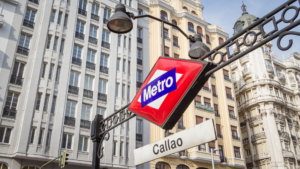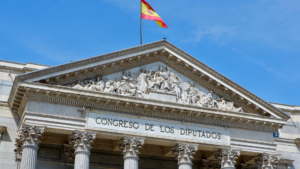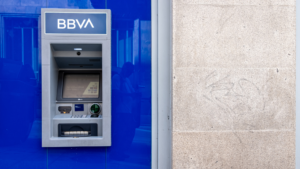Are you interested in living in Madrid? Well, you couldn’t have chosen a better city.
Madrid, the remarkable capital city of Spain, is filled with history, culture and intrigue. Every street tells a story and every corner brings a new adventure.
When moving to any new place, it is normal to feel a mixture of excitement, nervousness, and curiosity. It is important to remember that patience will be your best companion when living in Madrid, especially when navigating the intricacies of Spanish bureaucracy. To ease your transition into this iconic Spanish city, we’ve crafted a guide that highlights some of the essentials for expat life in Madrid.
Living in Madrid: Madrid Public Transport

Navigating Madrid is a breeze thanks to its world-class public transportation system. The city boasts a comprehensive network. In fact, Madrid has the second-largest metro in Europe and the sixth-largest globally. With over 300 metro stations spread across 12 different lines, accessing every key area in Madrid is convenient and efficient. Not to mention, the metro system is complemented by extensive bus routes and readily available self-service bikes.
For occasional travelers, the Madrid Metro offers a temporary card system. The purchase of 10 single tickets costs about €12, plus a one-time fee of €2-3 for a reusable card. You can refill this card as needed. If you have any questions, assistance is readily available at metro stations for any queries or help with ticket machines.
For regular commuters, the “abono” personal transport card is a more economical and hassle-free option. To obtain this card, you’ll need a standard passport-sized photo and an original ID document (EU ID, Spanish residency card, or passport). The application process, which can be initiated here, involves a one-time fee of €5 and takes about 10 minutes to complete. Once issued, you can load the card with a 30-day unlimited transport pass.
Madrid’s public transport zones are divided into Zone A (central Madrid) and Zone B (the outskirts). The monthly abono pass rates vary by age group and zone:
- Youth Tickets or “Abono Joven” (7 – 25 years): €20/month for access to both Zones A & B.
- Standard Tickets (26 – 64 years): €54.60/month for Zone A and €63.70/month for Zone B.
- Senior Tickets (65+): €3.30 for access to both Zones A & B.
Abono Joven
The “Abono Joven” in Madrid, which is a transport pass specifically for young people, is priced at 20 euros and is valid for travel in all zones. In 2023, there were special discounts for this pass: it was priced at 10 euros in January and 8 euros from February to June. These reduced prices were part of a promotion, as the regular price for the Abono Joven is 20 euros.
To monitor potential discounts and updates for the Abono Joven card in Madrid, you can visit the official website of the Community of Madrid’s transportation services. Additionally, balance inquiries and discount information can also be checked through the official Metro de Madrid website. These sources are regularly updated with the latest information regarding fares, discounts, and any special offers associated with the Abono Joven card.
How to get the Empadronamiento in Madrid

The “Empadronamiento” or “Padrón” certificate is a mandatory official document in Spain. The document registers your residential address in the local municipal records. It’s essential for every resident, whether a Spanish national or a foreigner, to acquire this certificate, ideally within the first month of their stay in Spain. This certificate is often required for various administrative procedures and is a prerequisite for obtaining your NIE (Foreigner’s Identification Number).
To successfully apply for the “Empadronamiento,” you must:
- Complete the application form, which can be accessed here.
- Present a valid passport and a photocopy of it for each individual being registered.
- Submit proof of your residence address in Spain.
- Schedule an appointment through the provided link, selecting “Padrón” as the category and then choosing “Certificado de Empadronamiento” as the service.
Securing this registration is a crucial step in establishing legal residency and accessing services in Spain.
How to obtain an NIE number in Spain

The “NIE” (Número de Identidad de Extranjero) serves as a Foreigner Identity Number in Spain. It is an essential identification document, different from a tax identification number, and is closely linked to your residence status and social security within the country. For individuals planning to reside in Spain for over three months, obtaining an NIE is a legal necessity. This is applicable to both EU and non-EU citizens.
Acquiring an NIE requires in-person application; the number cannot be processed online. It’s advisable to schedule your appointment in advance, preferably before your arrival in Spain, to ensure a smoother process.
How to schedule an NIE appointment?

Scheduling an NIE appointment in Madrid is a straightforward process that can be completed online. Individuals planning to move to or work in Spain must request an appointment through the official website of the Spanish government.
To begin, select the province where you will reside, in this case – Madrid. The website provides a step-by-step guide, allowing you to choose the relevant service and available time slots. It’s essential to prepare and bring the necessary documents, including your passport and any other required paperwork, to the appointment. Due to high demand, it’s advisable to schedule your appointment well in advance of your planned move to Spain.
At your appointment, you will need:
- A completed NIE application form.
- Your original passport, valid and current, along with a photocopy.
- Two recent, passport-sized photographs of yourself.
- Payment of the €10.71 government fee.
How to set up a bank account in Spain

Setting up a bank account in Spain, while not mandatory, is highly advisable for those planning to reside in the country. It streamlines your financial transactions, saving you from the often costly currency conversion fees and credit card commissions.
In Spain, you’ll encounter two primary categories of bank accounts:
- Resident Accounts: Intended for individuals who have established residency in Spain.
- Non-Resident Accounts: Designed for individuals residing outside of Spain.
It’s worth noting that opening a non-resident account may be simpler, but resident accounts typically offer greater flexibility and benefits.
The following documents are typically required to open a bank account in Spain:
- Valid passport as proof of identity.
- Your NIE (Número de Identidad de Extranjero) or Foreigner Identity Number.
- Proof of address, such as a utility bill or rental agreement.
- Evidence of your employment status, like a student card or employment contract.
Several banks in Spain, including LaCaixa, Bankinter, Santander, and Sabadell, may offer account opening services without requiring an NIE number.
Spanish banks generally operate from 8:30 AM to 2:30 PM, Monday to Friday, so be mindful of these hours when planning your visit.
It’s Time to Enjoy Madrid!

Now that you’ve got all of the logistics taken care of, it is finally time to embrace Madrid for the incredible city that it is.
Madrid, the vibrant capital of Spain, is renowned for its high quality of life, a factor that continually attracts expats from all corners of the globe. The city offers a unique blend of historical splendor, exemplified by landmarks like the majestic Royal Palace, and modern comforts. Madrid has a rich culture, evident in iconic spots like Plaza Mayor. Plus there are a plethora of opportunities for both work and leisure, making Madrid a sought-after destination for those seeking an enriching expat life.
For expats, Madrid offers an appealing balance between professional opportunities and a lifestyle that allows for personal growth and exploration. The ability to work remotely has opened doors for many to live in Madrid while maintaining ties to their home country. The city’s well-connected transport system, vibrant social scene, and the plethora of cultural experiences ensure that living in Madrid is never dull.
This dynamic blend makes Madrid stand out amongst other European capitals, providing an alluring mix of traditional Spanish charm and contemporary living for its diverse expat community.
Explore more about Madrid here:
- The Best Ways to Meet People in Madrid
- Urban Campus Coliving Spaces in Madrid
- Your Guide to the Best Summer Plans in Madrid, the Capital City!
- How to get a visa in Spain
Photo Credits:
- All photos used through the Canva Free Media License